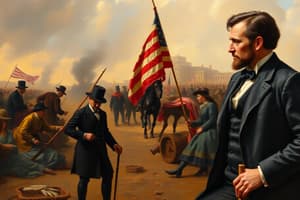Podcast
Questions and Answers
What was a primary reason for the formation of the Confederate States of America?
What was a primary reason for the formation of the Confederate States of America?
- The belief that states had the right to secede (correct)
- Opposition to the expansion of slavery
- Support for Lincoln's policies
- A desire for economic reform
Which candidate strongly supported slavery during the election of 1860?
Which candidate strongly supported slavery during the election of 1860?
- Abraham Lincoln
- Stephen Douglas
- John C. Breckinridge (correct)
- John Bell
What was the Republican Party's stance in the election of 1860?
What was the Republican Party's stance in the election of 1860?
- To promote the expansion of slavery
- To contain the expansion of slavery (correct)
- To maintain the current status of slave states
- To advocate for popular sovereignty
What role did economic differences play in the political landscape during the election of 1860?
What role did economic differences play in the political landscape during the election of 1860?
What was one challenge President Buchanan faced during the secession crisis?
What was one challenge President Buchanan faced during the secession crisis?
Why did the Democratic Party weaken after the election of 1860?
Why did the Democratic Party weaken after the election of 1860?
Which issue was at the center of the national debates during the election of 1860?
Which issue was at the center of the national debates during the election of 1860?
Which candidate attempted to bridge the political divide during the election of 1860?
Which candidate attempted to bridge the political divide during the election of 1860?
Flashcards
Election of 1860
Election of 1860
A pivotal US presidential election that significantly contributed to the start of the Civil War due to deep-seated divisions over slavery.
Lincoln's Victory
Lincoln's Victory
Abraham Lincoln's victory led several Southern states to secede from the Union.
Secession of Southern States
Secession of Southern States
Following Lincoln's election, several Southern states formally left the Union, initiating a major crisis.
Slavery as a Divisive Issue
Slavery as a Divisive Issue
Signup and view all the flashcards
States' Rights Debate
States' Rights Debate
Signup and view all the flashcards
Republican Party Platform
Republican Party Platform
Signup and view all the flashcards
Civil War Start
Civil War Start
Signup and view all the flashcards
Four Major Candidates
Four Major Candidates
Signup and view all the flashcards
Study Notes
The Election of 1860
- The election of 1860 was a pivotal moment in American history, ultimately leading to the outbreak of the Civil War.
- Four major candidates contested the presidency: Abraham Lincoln (Republican), Stephen Douglas (Northern Democrat), John C. Breckinridge (Southern Democrat), and John Bell (Constitutional Union).
- Lincoln's victory was a significant factor in the secession of Southern states.
Political Impact
- The election highlighted the deep divisions within the nation, particularly regarding slavery.
- The Republican Party's platform, which opposed the expansion of slavery, was viewed as a threat to Southern interests.
- This heightened sectional tensions and ultimately led to the formation of the Confederate States of America.
- The election outcome solidified the fracturing of the Democratic Party along sectional lines, which weakened their unified opposition to the Republicans.
Secession and Civil War
- South Carolina seceded from the Union in December 1860, followed by six other Southern states.
- The secessionist states claimed that Lincoln's election violated their rights and threatened their way of life.
- President Buchanan, the outgoing president, was unable to prevent the secession.
- The secession crisis escalated into the American Civil War in April 1861.
National Issues and Debates
- The central issue of slavery deeply divided the nation.
- The question of states' rights, and whether individual states had the authority to nullify federal laws, was a debated topic.
- Economic differences between the North and South also fueled conflict, including differing approaches to industrialization, agriculture, and trade policy.
- The differing views on tariffs, internal improvements, and westward expansion further exacerbated existing tensions.
Candidates and Parties
- Abraham Lincoln, representing the Republican Party, campaigned on a platform of containing the expansion of slavery, while acknowledging the legal right of slave states to exist.
- Stephen Douglas, representing the Northern Democratic Party, advocated for popular sovereignty.
- John C. Breckinridge, representing the Southern Democrats, strongly supported slavery.
- Lastly, John Bell, representing a more moderate Constitutional Union Party, tried to bridge the political divide.
- The Republican Party secured the presidency through a relatively narrow victory.
- The election outcome also highlighted the significant influence of sectionalism on the political landscape.
Studying That Suits You
Use AI to generate personalized quizzes and flashcards to suit your learning preferences.
Description
Explore the pivotal election of 1860 that set the stage for the American Civil War. This quiz covers key candidates, political impacts, and the deep divisions regarding slavery that marked the era. Assess your understanding of how Lincoln's victory influenced Southern secession and the broader context of American politics at the time.




